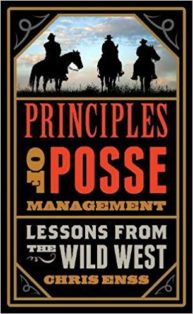Enter to win a copy of
The Principles of Posse Management:
Lessons from the Old West for Today’s Leaders.

Dora Hand was in a deep sleep. Her bare legs were draped across the thick blankets covering her delicate form, and a mass of long, auburn hair stretched over the pillow under her head and dangled off the top of a flimsy mattress. Her breathing was slow and effortless. A framed, graphite-charcoal portrait of an elderly couple hung above the bed on faded, satin-ribbon wallpaper and kept company with her slumber.
The air outside the window was still and cold. The distant sound of voices, backslapping laughter, profanity, and a piano’s tinny, repetitious melody wafted down Dodge City’s main thoroughfare and snuck into the small room where Dora was sleeping.
Dodge was an all-night town. Walkers and loungers kept the streets and saloons busy. Residents learned to sleep through the giggling, growling, and gunplay of the cowboy consumers and their paramours for hire. Dora was accustomed to the nightly frivolity and clatter. Her dreams were seldom disturbed by the commotion.
All at once the hard thud of a pair of bullets charging through the door and wall of the tiny room cut through the routine noises of the cattle town with uneven, gusty violence. The first bullet was halted by the dense plaster partition leading into the bed chambers. The second struck Dora on the right side under her arm. There was no time for her to object to the injury, no moment for her to cry out or recoil in pain. The slug killed her instantly.
In the near distance, a horse squealed, and its galloping hooves echoed off the dusty street and faded away.
A pool of blood poured out of Dora’s fatal wound, turning the white sheets she rested on to crimson. A clock sitting on a nightstand next to the lifeless body ticked on steadily and mercilessly. It was 4:15 in the morning on October 4, 1878, and for the moment nothing but the persistent moonlight filtering into the scene through a closed window marked the thirty-four-year-old woman’s passing.
Twenty-four hours prior to Dora’s being gunned down in her sleep, she had been on stage at the Alhambra Saloon and Gambling House. She was a stunning woman whose wholesome voice and exquisite features had charmed audiences from Abilene to Austin. She regaled love-starved wranglers and rough riders at stage and railroad stops with her heartfelt rendition of the popular ballads “Blessed Be the Ties That Bind” and “Because I Love You So.”
Adoring fans referred to her as the “nightingale of the frontier,” and admirers continually competed for her attention. More times than not, pistols were used to settle arguments about who would be escorting Dora back to her place at the end of the evening. Local newspapers claimed her talent and beauty “caused more gunfights than any other woman in all the West.”
Dora arrived in Dodge City in June of 1878. Several of the city’s residents who knew the songstress was on her way were eagerly anticipating her arrival. Among them was the mayor of Dodge City, James Kelley. Mayor Kelley had made Dora’s acquaintance at Camp Supply. He was smitten with her, and the pair became romantically involved shortly after she stepped off the stage in Dodge.

To learn more about the great posses of the frontier read
The Principles of Posse Management:
Lessons from Old West for Today’s Leaders.

